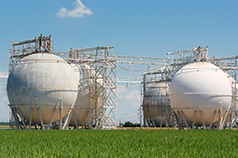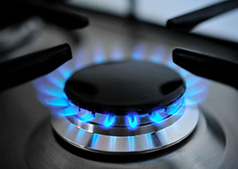
Natural Gas
Natural Gas is a hydrocarbon, a compound of hydrogen and carbon, formed by the decomposition of vast numbers of microscopic plants and animals millions of years ago. Broken down by heat and pressure of overlying rock, these organisms were transformed into oil and gas and stored in cavities beneath the surface of the earth.
On the earth’s surface and in the earth’s atmosphere, Natural Gas exists in a gaseous state. In underground deposits, Natural Gas consists of one or many hydrocarbons, normally a combination of methane, ethane, propane, butane, pentane, hexane and other heavier gases. The components and proportions depend on the conditions of the source where Natural Gas is found. In most cases, 70 % or more of the Natural Gas consists of methane, though other gases present may include carbon dioxide (CO2), hydrogen sulfide (H2S) and nitrogen (N2).
Due to its gaseous characteristic, Natural Gas is mostly supplied through a pipeline system.

Development of Natural Gas in Thailand
Natural Gas is distributed by pipeline networks, enhancing supply stability and providing just – in – time delivery reducing such overhead expenses as purchase orders and storage space etc. Thanks to complete and clean combustion, shutdown time and maintenance cost can be kept to a minimum. Since no sulfur oxides are produced, burning equipment is kept free of corrosion, which increases its efficiency and lifespan.
On top of that, the clean properties of Natural Gas contribute to an environmental friendly production. As Natural Gas is provided by a pipeline system, it reduces traffic congestion in and around industrial estates.
Needless to say that the flexibility of Natural Gas in industrial applications is highly appreciated by all our customers.
Moreover, In Thailand, Natural Gas price structures have been kept competitive compared to alternative fuels.

Where is Natural Gas Applied?
In every branch of industry wherever energy is needed, Natural Gas can be applied. It can be burned in power plants and industrial processes. It can be used as raw material to produce fertilizers and petrochemical products. More and more Natural Gas becomes the fuel for vehicles. In other countries, Natural Gas is widely applied for cooking, heating and production of hot water.
